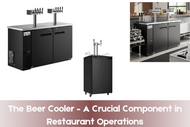The Beer Cooler – A Crucial Component in Restaurant Operations
The Beer Cooler – A Crucial Component in Restaurant Operations
Introduction
In the restaurant and bar industry, one of the most essential pieces of equipment is the beer cooler. Whether it’s a small gastropub, a high-volume sports bar, or a fine dining establishment with a curated beer selection, a beer cooler ensures that beer is stored, chilled, and served at the optimal temperature. This not only preserves the flavor and freshness of the beer but also contributes significantly to customer satisfaction and operational efficiency.
What Is a Beer Cooler?
A beer cooler, sometimes referred to as a back bar cooler, beer refrigerator, or beer fridge, is a refrigeration unit designed specifically to store bottled, canned, or kegged beer. These coolers maintain a consistent temperature, typically between 34°F to 38°F (1°C to 3°C), which is considered ideal for most beer types.
There are different types of beer coolers available:
-
Undercounter/back bar coolers: Designed to fit beneath a bar counter, these are perfect for storing bottled or canned beer within easy reach of bartenders.
-
Kegerators: These store kegs and dispense draft beer through taps, combining refrigeration and dispensing in one unit.
-
Walk-in coolers: Used by larger venues or breweries, these can store a large inventory of beer at the correct temperature.
-
Display coolers: These feature glass doors for product visibility, often placed in front-of-house areas to encourage impulse purchases.
Functions of a Beer Cooler
-
Temperature Control
The primary function of a beer cooler is to maintain a consistent cold temperature. Beer served too warm loses its crispness and can develop off-flavors. On the other hand, beer served too cold may numb the taste buds and mask its flavor profile. A good beer cooler ensures beer is stored and served at the right temperature for maximum enjoyment. -
Preservation of Freshness
Exposure to heat, light, or fluctuating temperatures can degrade beer quality. A beer cooler helps extend shelf life by reducing exposure to these factors, ensuring the beer maintains its intended flavor, carbonation, and integrity. -
Inventory Management
Most modern beer coolers come with adjustable shelves, LED lighting, and clear visibility, allowing staff to manage inventory more effectively. This ensures popular items are always stocked and easy to access. -
Customer Satisfaction
No customer wants to be served a warm beer. Consistently cold and fresh beer keeps customers happy, encourages repeat business, and builds a strong reputation for the establishment. -
Energy Efficiency and Cost Management
Newer models of beer coolers are energy-efficient, helping reduce utility costs. They’re designed to cycle cold air efficiently and maintain temperatures with minimal energy output. -
Support for Draft Systems
For restaurants serving draft beer, keg coolers or kegerators are indispensable. They not only refrigerate the keg but also support beer taps and CO2 systems needed to pour beer correctly.
Why Is a Beer Cooler Important in a Restaurant?
1. Consistency and Quality Control
Restaurants thrive on delivering a consistent dining and drinking experience. A beer cooler ensures every bottle, can, or pint is served at the same high standard every time. This consistency is key to customer satisfaction and building a loyal clientele.
2. Speed and Efficiency
During busy service hours, bartenders and waitstaff need to serve drinks quickly. A strategically placed beer cooler allows staff to grab cold beverages without slowing down operations, improving overall service speed.
3. Compliance with Health and Safety Regulations
Health codes require perishable goods, including beer (especially once opened), to be stored at specific temperatures. Using a proper beer cooler helps restaurants comply with these regulations, avoiding fines or potential closures.
4. Increased Sales Opportunities
A well-stocked and visible beer cooler—especially with glass doors—can attract customers to purchase more. It also allows restaurants to showcase their variety of beer offerings, including seasonal brews, craft selections, or special promotions.
5. Brand Presentation and Aesthetics
Modern beer coolers are designed to complement a restaurant’s interior with sleek finishes, lighting, and clean lines. They can serve as both a functional tool and a branding asset, giving the establishment a professional and polished look.
6. Storage Optimization
Beer coolers maximize limited space in a bar or restaurant by organizing drinks efficiently. Adjustable racks and customizable layouts mean more storage in less space, allowing room for other essential equipment or inventory.
Choosing the Right Beer Cooler for Your Restaurant
When selecting a beer cooler, several factors should be considered:
-
Capacity: Estimate your beer sales and choose a size that matches your inventory needs.
-
Cooling Method: Some coolers use forced air, while others use cold plate systems. Forced air models offer more even cooling.
-
Energy Rating: Opt for energy-efficient models to reduce long-term operational costs.
-
Design and Placement: Choose between undercounter, upright, or display models depending on your layout.
-
Maintenance Requirements: Easy-to-clean interiors, removable shelves, and self-closing doors are all features that improve ease of use and maintenance.
Conclusion
In the competitive foodservice industry, details matter—and the beer cooler is one detail that makes a big difference. More than just a fridge, it is a vital piece of equipment that affects product quality, service efficiency, regulatory compliance, and customer satisfaction. Investing in a reliable beer cooler is not just about keeping beverages cold—it's about delivering an experience that brings customers back for more.

